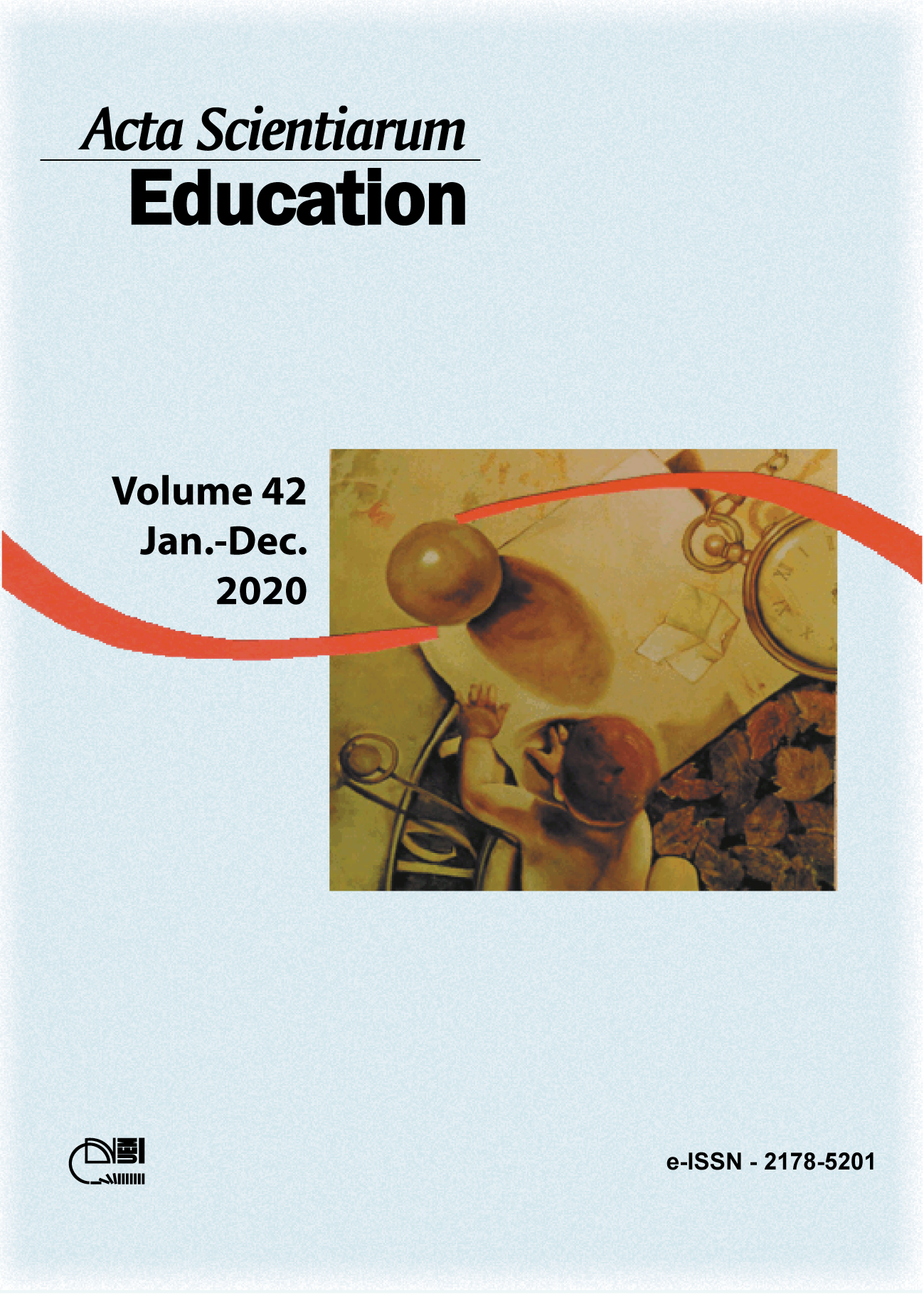Research in education in cyberculture: teacher training for / in complexity
Chamada temática: Redes Educativas e os desafios atuais da Cibercultura
Abstract
This text is the result of one of the collaborative researches, related to teacher training, developed in partnership with Basic Education teachers who participated in an Umbrella project, carried out in the period from 2014 to 2019, by the research group that we coordinate, within the scope of programs stricto sensu graduate courses from universities in Brazil and Colombia. Based on the epistemology of complexity, it aims to reflect on the training of teachers to work in the context of cyberculture, consisting of technological and linguistic complexities, and characterized by the multiliteracies that weave the citizen life of teachers and students. Collaborative research was adopted, in this study, as an educational and scientific methodology and principle, of political-educational quality, and Discursive Textual Analysis was the basis for the analysis and interpretation of data. The results obtained, from a semi-structured interview, carried out between February and May 2019, with six teacher educators, working in Higher Education and / or in Basic Education, lead to the conclusion that teacher training needs to articulate the pedagogical, political and cultural for teaching in a school routine marked by uncertainties and conflicts that take place in the social, science and technology fields; the diversity of culture and languages; by the polyphony of conflicts that impels the teacher to understand the meaning and the social place of the school. This reality challenges the teacher to train for the problematization, coping and collective overcoming of challenging situations, among them, that of educating in the context of complexity that manifests itself daily in cyberculture.
Downloads
References
Bakhtin, M. (2003). Metodologia das ciências humanas. In M. Bakhtin, Estética da criação verbal (p. 393-410). São Paulo, SP: Marins Fontes.
Bakhtin, M. (Volochinov). (2004). Marxismo e filosofia da linguagem: problemas fundamentais do método sociológico na ciência da linguagem (M. Lahud, & Y. F. Vieira, Trad.). São Paulo, SP: Hucitec.
Bandeira, H. M. M. (2016). Pesquisa colaborativa: unidade pesquisa-formação. In I. M. L. M. Ibiapina, H. M. M. Bandeira, & F. A. M. Araujo (Orgs.), Pesquisa colaborativa: multirreferenciais e práticas convergentes (p. 63-74). Teresina, PI: EDUFPI
Bates, T. (2016). Educar na era digital: design, ensino e aprendizagem. São Paulo, SP: Artesanato Educacional.
Desgagné, S. (2007). O conceito de pesquisa colaborativa: a idéia de uma aproximação entre pesquisadores universitários e professores práticos. Revista Educação em Questão, 29(15), 7-35. Doi: 10.7202/031921ar
El Tiempo. (2020). El día a día de los profesores en tiempos de coronavirus. Recuperado de https://www.eltiempo.com/vida/educacion/coronavirus-el-dia-a-dia-de-los-profesores-tras-cierre-de-colegios-475338
Freire P. (1996). Pedagogia da autonomia. São Paulo, SP: Paz e Terra.
Galeano, E. (1999). De pernas pro ar: a escola do mundo ao avesso. Porto Alegre, RS: L&PM.
Gatti, B. A. (2003). Formação continuada de professores: a questão psicossocial. Cadernos de Pesquisa, 119, 191-204. Doi: 10.1590/S0100-15742003000200010
Gatti, B. (2017). Formação de professores, complexidade e trabalho docente. Revista Diálogo Educacional, 17(53), 721-737. Doi: 10.11606/issn.2316-9036.v0i100p33-46
Giroux, H. A. (1997). Os professores como intelectuais: rumo a uma pedagogia crítica da aprendizagem. Porto Alegre, RS: Artes Médicas.
Ibiapina, I. M. (2008). Pesquisa colaborativa: investigação, formação e produção de conhecimentos. Brasília, DF: Líber Livros.
Imbernón, F. (2011). Formação docente e profissional: formar-se para a mudança e a incerteza. São Paulo, SP: Cortez.
Imbert, F. (2003). Para uma práxis pedagógica. Brasília, DF: Plano.
Macedo, R. S. (2000). A etnopesquisa crítica e multirreferencial nas ciências humanas e na educação. Salvador, BA: EDUFBA
Morin, E. (2011). Introdução ao pensamento complexo. Porto Alegre, RS: Sulina.
Nóvoa, A. (2017). Firmar a posição como professor, afirmar a profissão docente. Cadernos de Pesquisa, 47(166), 1106-1133. Doi: 10.20500/rce.v14i29.21710
Rodríguez Jerez, S. A. (2019) Prólogo. In S. A. Rodríguez Jerez (Coord.), Enseñar y educar en la civilización digital (p. 11-16). Bogotá, CO: Universidad Sergio Arboleda.
Rodríguez Jerez, S. A. (2020). El modelo TPACK como perspectiva de análisis en la integración de TIC para la educación: un estado del arte. In J. Morales, I. Molina, & S. A. Rodríguez Jerez (Coord.), Importancia de las TIC en los procesos de enseñanza-aprendizaje: estudios en la educación media y superior (p. 11-33). Bogotá, CO: Universidad Sergio Arboleda.
Santos, B. S. (2011). A crítica da razão indolente: contra o desperdício da experiência. São Paulo, SP: Cortez.
Santos, E., & Rossini, T. S. S. (2017). A produção de recursos educacionais na formação de professores-autores. In E. Santos, R. Santos, & C. Porto. Múltiplas linguagens nos currículos (p. 37-62). João Pessoa, PA: UFPB.
Schön, D. (2000). Educando o profissional reflexivo: um novo design para o ensino e aprendizagem. Porto Alegre, RS: Artes Médicas Sul.
Stringer, E., Lewin, C., & Coleman, R. (2019). Using digital technology to improve learning. Guidance report. Cardiff, UK: Education Endowment Foundation.
Triviños, A. N. S. (1987). Introdução à pesquisa em ciências sociais: a pesquisa qualitativa em educação: o positivismo, a fenomenologia, o marxismo. São Paulo, SP: Atlas.
Vinck, D. (2018). Humanidades digitales: la cultura frente a las nuevas tecnologías. Madrid, ES: GEDISA.

This work is licensed under a Creative Commons Attribution 4.0 International License.
DECLARATION OF ORIGINALITY AND COPYRIGHTS
I declare that this article is original and has not been submitted for publication in any other national or international journal, either in part or in its entirety.
The copyright belongs exclusively to the authors. The licensing rights used by the journal are the Creative Commons Attribution 4.0 (CC BY 4.0) license: sharing (copying and distributing the material in any medium or format) and adaptation (remixing, transforming, and building upon the material thus licensed for any purpose, including commercial purposes) are permitted.
It is recommended that you read this link for more information on the subject: providing credits and references correctly, among other crucial details for the proper use of the licensed material.














































